 |
shared practice | ||||||||||||
|
publications |
||||||||||||
| Evaluation of the Environment Agency's consultation on the Generic Design Assessment (GDA) for new nuclear power stations Commissioned by Environment Agency Written by Diane Warburton (2012) During 2010, the Environment Agency launched a major consultation on the Generic Design Assessment they were undertaking to assess two reactor design options for new nuclear power stations. The GDA was a new process developed by the Environment Agency and the Office for Nuclear Regulation (ONR) , and the consultation enabled the Agency to gain feedback from stakeholders as part of its GDA assessment process. Shared Practice was commissioned to undertake an independent evaluation, which aimed to assess whether the consultation had achieved its objectives, and to identify lessons from the experience and improvements that could be made in planning future public and stakeholder engagement. The report describes the main findings from the evaluation which was carried out from December 2009 to March 2012. The evaluation research included detailed reviews of comments from all stakeholders, seminar participants, questionnaire respondents, as well as from those who chose not to respond to the consultation. |
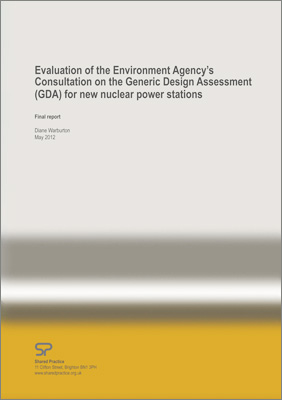 |
||||||||||||
| Pathways through participation Funded by Big Lottery Fund Written in partnership between NCVO, IVR and Involve (2011) The Pathways through Participation project was a major three-year research project led by the National Council for Voluntary Organisations (NCVO) in partnership with the Institute for Volunteering Research (IVR) and Involve (with Diane Warburton of Shared Practice). The project aimed to improve understanding of how and why people participate, how their involvement changes over time, and what pathways, if any, exist between different activities. Preliminary research reports are shown below. The research identified three broad and overlapping categories of participation that cover a wide range of activities: social, public and individual participation. Using methodology that placed individuals’ own experiences throughout their lives at the centre of the research, the researchers examined three different geographical contexts (suburban Enfield, rural Suffolk and inner city Leeds), conducting over 100 in-depth interviews, enabling people to tell their stories of participation throughout their lives in their own words. Three accompanying papers identified the specific implications of the project findings for volunteer management, local engagement in democracy and for national policy agendas that relate to citizen engagement. |
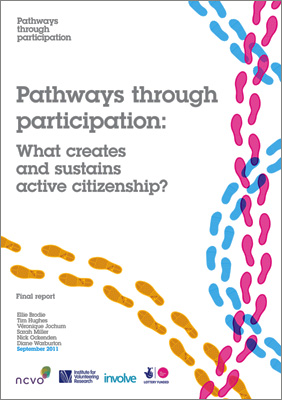 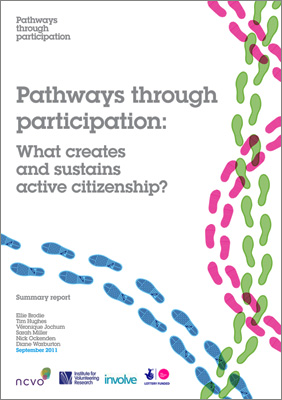 |
||||||||||||
| Evaluation of the Living with Environmental Change (LWEC) Citizens’ Advisory Forum Commissioned by LWEC Written by Diane Warburton (2011) During 2010, the Living with Environmental Change (LWEC) partnership launched a Citizens' Advisory Forum to bring public attitudes and values into its strategic decision making processes. The project was co-funded and supported by the Department for Business, Innovation and Skills’ Sciencewise-ERC programme. The Forum was designed to provide a space in which members of the public could deliberate on some of the issues that the LWEC partnership is seeking to address on climate change including flooding, adaptation and wider governance and decision making processes. Shared Practice was commissioned to evaluate the establishment and activity of the Forum. The research included observation, questionnaires and interviews with public participants, LWEC staff and others involved in delivering the process, and analysis of all data collected. The report considers the extent to which the aims, objectives and success criteria have been achieved, and identifies some lessons for future practice. |
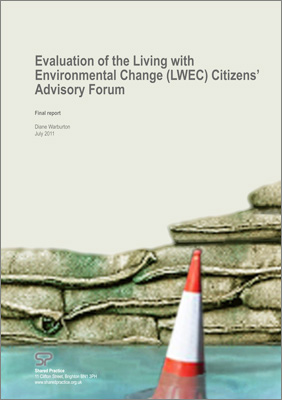 |
||||||||||||
| Pathways through participation Funded by Big Lottery Fund Written in partnership between NCVO, IVR and Involve (2009) The final reports of Pathways through Participation project are shown above. At the start of the project a literature review explored the material around the key issues for the project and provided a sound basis for the rest of the research. Summary papers highlighted some of the key points to come out of the literature review. |
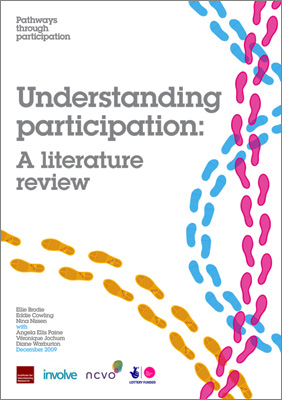 |
||||||||||||
| Evaluation
of BERR's engagement of the public and other interested parties in the future of civil nuclear power in the UK Commissioned by COI on behalf of DTI; published by DECC Written by Diane Warburton, with Nigel Ordish (2009) In May 2007, the Government launched a major consultation exercise on the future of civil nuclear power in the UK. The consultation was led by the Department of Trade and Industry (DTI); responsibilities for energy and climate change were later passed to the Department of Energy and Climate Change (DECC). The consultation, which ran for 20 weeks, was one of the fullest such exercises undertaken in the UK in terms of consultation activities and events. 5,200 copies of a 205-page consultation document were distributed, and 2,728 detailed written responses were received from stakeholders and members of the public (online and in hard copy). Evidence for the consultation was also provided from nine regional deliberative public engagement events (with nearly 1,000 participants) and 21 stakeholder events (with over 600 stakeholders), as well as other meetings with particular interest groups. A total of 4,309 individuals contributed to the consultation at the events or in writing. Shared Practice undertook a detailed evaluation of the consultation, from April 2007, the report of which was published by DECC in October 2009. The report summarises the methodology used for the evaluation, the purpose and objectives of the consultation, and describes and assesses all the main activities within the consultation, drawing significantly on feedback from all those involved. It considers the extent to which the objectives were achieved, identifies the elements of the process that worked particularly well and less well, and identifies some lessons for future practice in the light of these findings. The annexes include detailed analyses of all the statistical and qualitative data. |
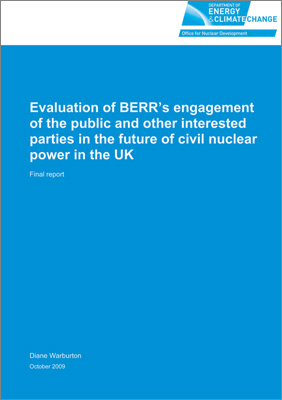 |
||||||||||||
| Evaluation
of the Drugsfutures project
Commissioned by the Academy of Medical Science Written by Diane Warburton (2008) In 2006, the Academy of Medical Sciences (AMS) launched an independent inquiry into brain science, addiction and drugs. The AMS convened a multidisciplinary expert Working Group to conduct the inquiry, designed to culminate in recommendations for public policy and research. A significant strand of the Working Group's inquiry was a programme of public engagement activities: the Drugsfutures project. The Drugsfutures project was funded and supported by the Sciencewise-ERC programme of the Department of Business, Innovation and Skills (BIS). This report presents an evaluation of the public engagement activities undertaken through the Drugsfutures project. In particular, the evaluation focuses on the deliberative public engagement elements of the engagement, as these were the elements of the process that potentially had the most lessons for future AMS public engagement work. The full report and annexes include detailed analyses of all the statistical and qualitative data. The summary report identifies the main findings from the evaluation study of the Drugsfutures project. |
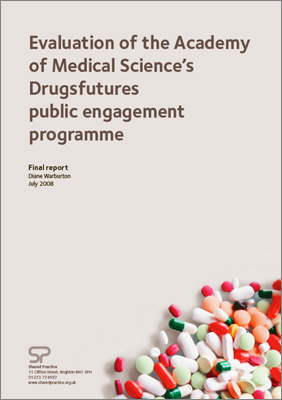 |
||||||||||||
| Evaluation of public engagement process on climate change Commissioned by the Department for Environment, Food and Rural Affairs Written by Diane Warburton (2008) Report of the evaluation of a Defra public engagement process to help government design policy to maximise positive individual behaviour on climate change. The process (run by Opinion Leader) included regional workshops and a national summit of 150 public participants. |
 |
||||||||||||
| Tidal
power consultation evaluation
Sustainable Development Commission Written by Diane Warburton (2008) In 2006, the Sustainable Development Commission (SDC) launched a research project on tidal power in the UK. The project comprised a detailed initial desk research exercise (from November 2006), followed by a public and stakeholder engagement programme (from March to April 2007). This report presents an evaluation of the public and stakeholder engagement programme. In particular, the evaluation focuses on the deliberative public engagement elements of the consultation, and the stakeholder workshops, as these were the elements of the process that potentially had the most lessons for future SDC public and stakeholder engagement work. The report considers the extent to which the objectives were achieved, identifies the elements of the process that worked particularly well and less well, and identifies some lessons for future practice in the light of these findings. The final section identifies the particular value the process provided for public participants, stakeholders and SDC policy makers. |
 |
||||||||||||
| Deliberative
public engagement: nine principles In partnership with the National Consumer Council/Involve Lead author was Diane Warburton, supported by Lindsey Colbourne at the Sustainable Development Commission, Karin Gavelin and Richard Wilson at Involve and Anthony Noun at the National Consumer Council (2007-08) Deliberative public engagement is a distinctive approach to involving people in decision-making. It is different from other forms of engagement in that it is about giving participants time to consider and discuss an issue in depth before they come to a considered view. The aim of this document is to encourage and support deliberative public engagement in public policy by providing short and simple principles to guide future planning and delivery. |
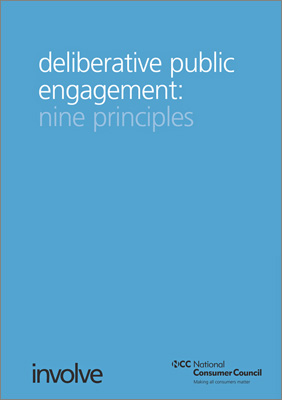 |
||||||||||||
| Advocacy, participation and NGOs in planning APaNGO - Commissioned by the TCPA Written by Diane Warburton with Gideon Amos and the APaNGO partners (2007) APaNGO was a transnational partnership project, led by the Town and Country Planning Association (TCPA) with Brusselse Raad voor het Leefmilieu, (Belgium); Geuzenveld-Slotermeer, City District of Amsterdam (the Netherlands); Planning Aid for London (UK) and Spectacle Productions Ltd (UK). The project, part-funded by the European Union’s INTERREG IIIB programme for North West Europe (NWE), was one of the first European Union action research projects on community participation in planning and development. Its underlying philosophy was the importance of fostering constructive community engagement in order to help deliver sustainable development on the ground. The interim report summarises the research on planning systems, participation mechanisms, tools and techniques in Belgium, France, Germany, Luxembourg, the Netherlands, the Republic of Ireland, and the UK. The final report includes essays on individual demonstration projects from the UK, Belgium and the Netherlands, describing the participation processes employed and the lessons learned. The report concludes with a summary of the overall issues arising from these case studies, followed by conclusions drawn from them on the conditions necessary for effective participation in planning in future. |
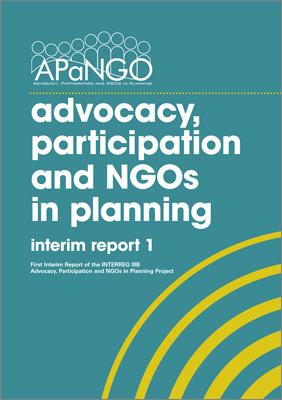 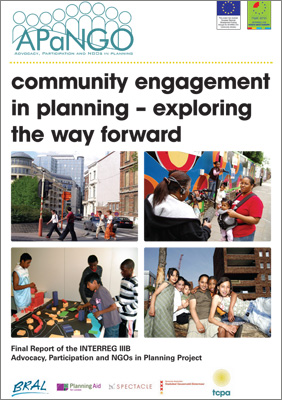 |
||||||||||||
| Evaluation
of public dialogue on energy research Commissioned by Research Councils UK (2008) In March 2007, Research Councils UK (RCUK) launched a public dialogue to elicit and understand the public's priorities for energy research to inform their strategic decision-making for the next three years. The aim was for information on public views to be provided to these decision-makers alongside academic, industry and government views, to help them shape their thinking and decisions on future energy research priorities. Shared Practice was commissioned to evaluate the whole of the dialogue process, which ran from April to November 2007. Evaluation research included interviews with public participants, project advisors, decision makers and associated experts. The full report includes detailed analysis of all the collected statistical and qualitative data, and the summary identifies the main findings from the evaluation. |
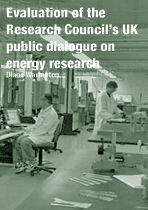 |
||||||||||||
| Improving
poor environments: the role of learning architectures in developing and spreading good practice Commissioned by the Environment Agency (2007) In 2005, the Environment Agency began a programme of work to develop a system to identify and improve the poorest environments in England and Wales: the Improving Poor Environments (IPE) programme. With Defra, the Agency recognised that, in order to build an effective national programme, a different approach to learning was needed from conventional models based only on providing guidance and disseminating good practice. Shared Practice was part of the team (with Sustainable Futures) commissioned to review learning approaches in the public sector, and propose a new approach to learning to support the design and development of the IPE programme. This report summarises the research (including a literature review and interviews), provides analysis of the implications for the IPE programme, and makes a series of recommendations for a learning architecture for sharing knowledge and good practice from innovative local practical projects. The research was completed in 2006 and this report was published by the Environment Agency in 2007. It is one of a series of four reports on the IPE programme. |
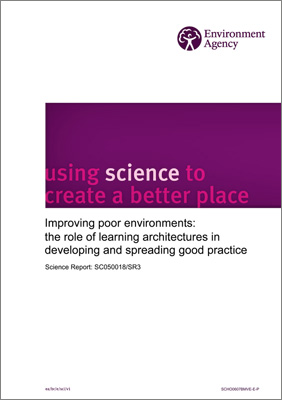 |
||||||||||||
| Community
learning and action for sustainable living Commissioned and published by WWF and Defra (2007-2008) Written by Diane Warburton Community learning and action for sustainable living (CLASL) was a three-year WWF project, funded by Defra. The project worked with three pilot communities to develop a community-based method to encourage and enable local groups to define and work towards sustainable living. Shared Practice was involved in the initial design of the project, and initially reviewed the literature to feed into the early development of the project. The full literature review provides a synthesis of the thinking at the time on behaviour change, community engagement techniques and sustainable development. The shorter summary paper identifies the main themes that emerged. Shared Practice then undertook a full evaluation, published in 2008. The evaluation focused on the methodology for supporting sustainable living at community level. The evaluation report was published jointly by WWW-UK and Defra in 2008, alongside a guide to support that can enable local progress. |
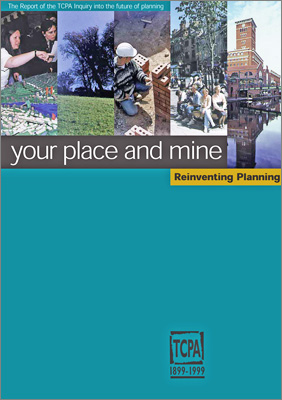
|
||||||||||||
| Making a difference: A guide to evaluating public participation in central government Commissioned by the Department of Constitutional Affairs Written by Diane Warburton, published by DCA/Involve (2007) Public participation has become a central plank of public policy-making. Increasingly, decision-makers at all levels of government build citizen and stakeholder engagement into their policy-making processes. This guide is intended to help those involved in planning, organising or funding public participation in central government to use evaluation to understand the different factors involved in creating effective public participation. It provides guidance on setting and measuring objectives, evaluating impact, and identifying lessons for future practice. |
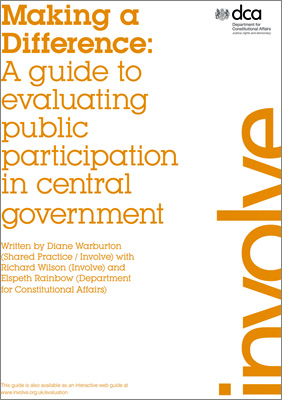 |
||||||||||||
| Evaluation of the HFEA public consultation on hybrid and chimera embryos Commissioned by the Human Fertilisation and Embryology Authority Written by Diane Warburton, published by HFEA/Shared Practice (2007) In April 2007, the Human Fertilisation and Embryology Authority (HFEA) launched a major public consultation on the creation and use of human-animal embryos for research. The consultation ran for three months, from 26 April to 20 July 2007, and included focus groups, deliberative workshops, polling and an open public meeting. HFEA commissioned Shared Practice to evaluate the public consultation exercise which was the largest of its type the Authority had undertaken at the time. The full report of the evaluation findings includes detailed analyses of all the statistical and qualitative data (with separate annexes), and the summary identifies the main findings from the evaluation. |
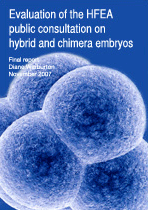 |
||||||||||||
| Evaluation of Your Health, Your Care, Your Say Commissioned by the Department of Health Written by Diane Warburton, published by Department of Health (2006) The Your Health, Your Care, Your Say (YHYCYS) initiative for the UK's Department of Health created one of the largest and most ambitious public engagement exercises ever mounted in the UK. The aims were complex and ambitious: to ensure that the public (especially the 'seldom heard') were actively involved in deliberative debates on contentious issues in health and social care services, alongside creating a high public profile to encourage wide public and stakeholder involvement. Shared Practice was commissioned to evaluate the initiative, with a focus on the local, regional and national deliberative events that involved members of the public. The evaluation provided conclusions about the extent to which the methodology chosen for delivery of YHYCYS met the objectives set, and drew out learning for future public engagement activity. |
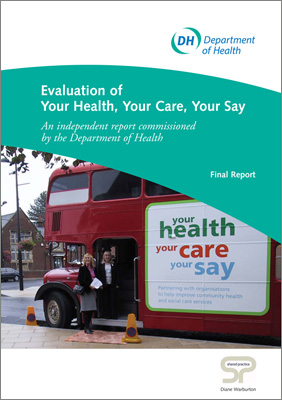 |
||||||||||||
| People and Participation How to put citizens at the heart of decision-making Co-researched, produced and edited by Diane Warburton, Richard Wilson and Edward Andersson, published by Involve (2005) Set up in 2003, Involve aims to support the development of a democracy where citizens are able to take and influence decisions that affect their lives.. 'People and Publication' was the first publication from Involve and was based on new research funded by the Home Office Civil Renewal Unit during 2004/5. The publication examines some of the main issues affecting participation in the UK at the time, then offers guidance to planning for participation, identifying key steps to ensure that participation works and providing a detailed assessment of some different participation methods. |
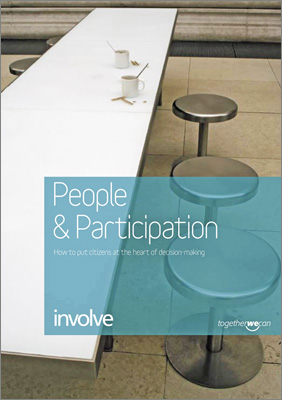 |
||||||||||||
| q | |||||||||||||
| Evaluating the Heritage Lottery Fund development programme Commissioned by the Heritage Lottery Fund Written by Diane Warburton, published by Heritage Lottery Fund (2006) Report of evaluation of the HLF's outreach and development programme which aimed to encourage grant applications from hard-to-reach and other groups new to heritage activities. In 2002, the Heritage Lottery Fund (HLF) made some important changes to the way it delivered services to applicants and potential applicants, guided by the aims of HLF's Strategic Plan 2002-2007. This evaluation focused on the programme of development work launched as part of these changes in 2002. The evaluation research included a mix of statistical analysis, interviews with staff in four HLF regions, and interviews with a small selection of grantees who had direct experience of HLF's development work. |
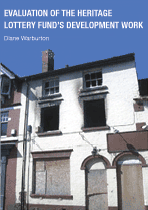 |
||||||||||||
| The True Costs of Participation Funded by Home Office Civil Renewal Unit (2004-2006) Written by Edward Anderson, Diane Warburton and Richard Wilson, published by Involve (2005) The aim of this research by Involve was to take a step forward in our understanding of public participation and develop a greater appreciation of the wider costs and benefits of participatory activity. The research reviewed existing economic assessment methods and economic assessments of participation, and identified how people were currently recording costs and benefits. It also undertook interviews, a literature review and detailed analysis of 15 case studies. A separate report introduced a framework for future thinking about the costs and benefits of participation. |
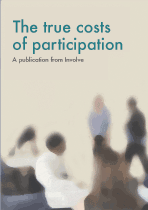 |
||||||||||||
| Community and Sustainable Development Participation in the Future Edited by Diane Warburton, published by Earthscan (1998) Community and Sustainable Development is about the future - a future in which people have the resources to meet their needs. This basic message of sustainable development recognises the need to conserve environmental resources, but also to support and build the human resources through which the future will be realised, by ensuring that local people are able to participate in the decisions and activities which affect their living environment. Featuring contributions from many leading figures in the fields of community participation and sustainable development (including Tim O'Riordan, Robert Chambers, Amitai Etzioni, Gary Lawrence, Alex MacGillivary, Judy Ling Wong), this book shows how participation can extend democracy, citizenship and accountability. It also considers the role of lay knowledge and civic science in setting and achieving appropriate goals for development, and describes how participatory initiatives can inspire sustainable action on poverty and social inclusion. Published 1998, reprinted 2000 ISBN 1 85383 531 5 (paperback) ISBN 1 85383 530 7 (hardback) |
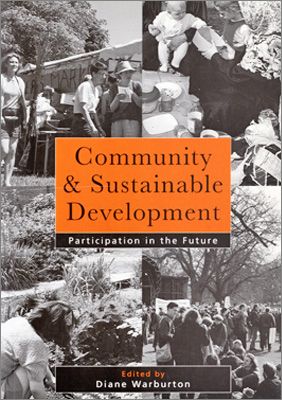 |
||||||||||||
| From Here to Sustainability. Politics in the Real World Commissioned by the Real World Coalition. Wriitten and edited by Ian Christie and Diane Warburton, published by Earthscan (2001) This book was commissioned by the Real World Coalition to feed into debates ahead of the 2002 General Election in the UK. It took the view that for more and more people, politics is increasingly divorced from the problems it should be addressing and solving, including around food safety and other health scares, traffic congestion and decaying infrastructure, rural decline and urban squalor, natural disasters, loss of species and habitats and the threat of climate change. With increased affluence and consumption, there were also growing inequalities within and between societies, and more stress and greater insecurity at work, at home and in the community. This book explains the 'joined-up' approach that was seen to be required if government commitment to sustainable development was to become a reality. It shows how large the 'sustainability gap' is between rhetoric and action, and what has to be done to begin to close it. It identifies a series of interlocking problems, and proposes a radical agenda of reform in national and international politics and economic policy to attain quality of life and a shared sense of purpose to our lives and societies. ISBN 185383 735 0 (paperback) |
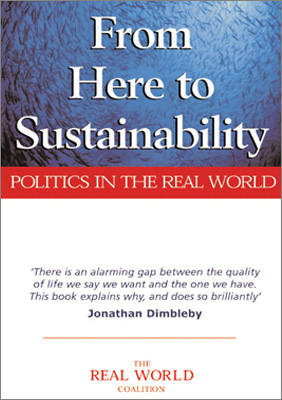 |
||||||||||||
| Rematerialise.org Design Council and Kingston University Project directed by Nigel Ordish (2002) Design Council Innovation funded research to develop Rematerialise.org, a unique virtual library of environmentally sustainable and low impact materials, based on research initiated in 1994 by Jakki Dehn at Kingston University. The library was developed to allow designers access to material information by type, process, character and application, with accompanying case studies, videos, and links to related contacts. The information was targeted particularly to suit small and medium size enterprises unable to research, develop or maintain their own technical information resources. The report details the stages of project development led by Nigel Ordish when Head of the School of 3D Design, Kingston University. It also examines the meeting of objectives, selection criteria and levels of participation, providing broader messages for future research. |
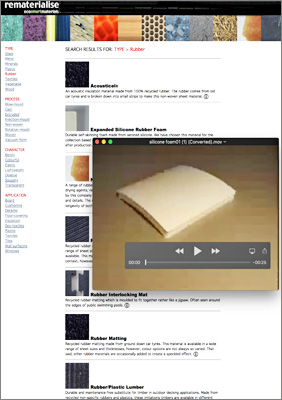 |
||||||||||||
| Evaluating participatory, deliberative and co-operative ways of working Written by Diane Warburton on behalf of the InterAct evaluation group (which also included Jonathan Dudding, Florian Sommer and Perry Walker), published by InterAct (2001) This document was designed to provide a framework for evaluating participatory, deliberative and co-operative processes, based on the experience of practitioners. It summarises the benefits of good evaluation, and provides guidance on what data to look for and how to do evaluation (including ideas for indicators of success). |
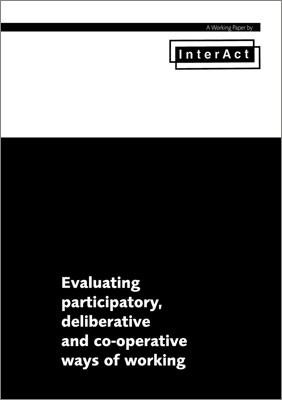 |
||||||||||||
| Evaluation of The Environment Council's National Waste Dialogue Written by Diane Warburton, published by the Environment Council (2004) The National Waste Dialogue (NWD) was a series of stakeholder dialogue processes that ran between 1999 and 2002 as an experimental approach to addressing the complex sustainability issue of waste management. This detailed evaluation summarises the stakeholder dialogue approach and reviews its strengths and weaknesses in this instance. The Summary Report presents a brief outline of the main findings of the evaluation research in relation to identified key themes. The Final Report, contains more detail on the theoretical background and the methodology used for the evaluation, the processes used in the two phases of the NWD and a more detailed analysis of the findings. |
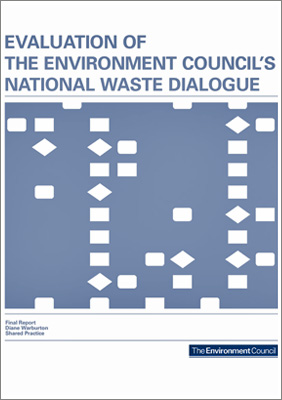 |
||||||||||||
| Your place and mine. Reinventing planning
Written by Diane Warburton, Secretary to the Inquiry, published by TCPA (1999) In 1998, the Town and Country Planning Association launched a major national Inquiry to develop a new strategic vision for planning; establishing the principles, purpose, function and scope of planning in a changed world, and recommending how the system should be restructured to reflect and fulfil these principles, purposes and functions. The Inquiry was launched with a view to the TCPA's centenary in 1999. A distinguished Inquiry panel was established, chaired by Baroness Sally Hamwee. The role of the Inquiry Panel was to receive and consider evidence presented in a number of forms, and to develop conclusions and recommendations. The report was drafted and debated by the whole Panel and, although all Panel members did not necessarily endorse all aspects, they were pleased to offer the report as a stimulus for further debate. |
 |
||||||||||||
|
|
|||||||||||||